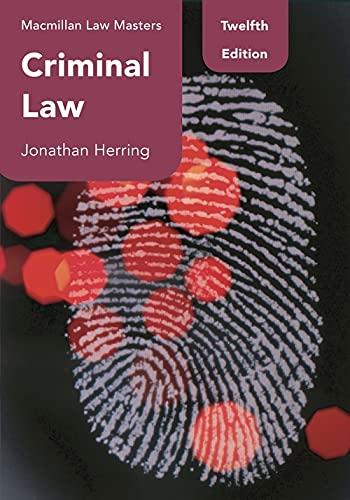Question
EXERCISE 1-6. MULTIPLE CHOICE, INCOME TAXATION 1. 1st Statement: Our constitution does not favor double taxation 2nd Statement: If double taxation occurs, the taxpayer may
EXERCISE 1-6. MULTIPLE CHOICE, INCOME TAXATION
1. 1st Statement: Our constitution does not favor double taxation
2nd Statement: If double taxation occurs, the taxpayer may seek relief under the uniformity rule of the equal protection guarantee
a. 1st statement correct, 2nd statement wrong.
b. 1st statement wrong, 2nd statement correct.
c. Both statements are wrong.
d. Both statements are correct.
2. The power of taxation is inherent in sovereignty being essential to the existence of every government. Hence, even if not mentioned in the Constitution the state can still exercise the power It is essentially a legislative function. Even in the absence of any constitutional provision, taxation power falls to Congress as part of the general power of lawmaking
a. False, False
b. False, True
c. True, True
d. True, False
3. A tax must be imposed for public purpose. Which of the following is not a public purpose?
a. National defense
b. Purchase of anti Covid-19 vaccines for
c. Improvement of the sugar industry
d. Beautification of a barangay chapel.
4. The amount required is dictated by the needs of the government in
a. License fee
c. Toll
b. Tax
d. Debts
5. Which of the following statements is not true?
a. If a taxpayer is acquitted in a criminal violation of the Tax Code, this acquittal does not exonerate him from his civil liability to pay the taxes.
b. A conviction for tax evasion is not a bar for collection of unpaid taxes.
c. A tax assessment notice is necessary to a criminal prosecution for willful attempt to defeat and evade payment of taxes.
d. Criminal proceedings under the Tax Code is now a mode of collection of internal revenue taxes, fees or charges.
6. A tax wherein both the incidence of or the liability for the payment of the tax as well as the burden of the tax falls on the same person:
a. direct tax
c. personal tax
b. indirect tax
d. property tax
7. Which of the following is an inherent limitation on taxation?
a. Non-delegation of the legislative power to tax.
Non-impairment of the jurisdiction of the Supreme Court in tax cases.
b. c. No appropriation for religious purposes.
d. Equal protection of the law.
8. No law granting any tax exemption shall be passed without the concurrence of
a. Majority of all the members of the House of Representatives
b. Majority of all the members of the Senate.
c. Majority of all the members present.
d. Majority of all the members of Congress.
9. One of the following is not a characteristic of police power in distinguishing it with the other powers.
a. It regulates both liberty and property.
b. The property taken is destroyed for the purpose of promoting the
general welfare.
c. The amount imposed should only be sufficient to cover the
necessary expenses of police surveillance and regulation.
d. The authority to exercise the power may be granted to public service companies.
10. Police power as distinguished from eminent domain:
a. Just compensation is received by the owner of the property.
b. Maybe exercised by private individuals.
c. Superior to the non-impairment clause of the constitution
d. Property taken by the government for public purpose
Step by Step Solution
There are 3 Steps involved in it
Step: 1

Get Instant Access to Expert-Tailored Solutions
See step-by-step solutions with expert insights and AI powered tools for academic success
Step: 2

Step: 3

Ace Your Homework with AI
Get the answers you need in no time with our AI-driven, step-by-step assistance
Get Started


